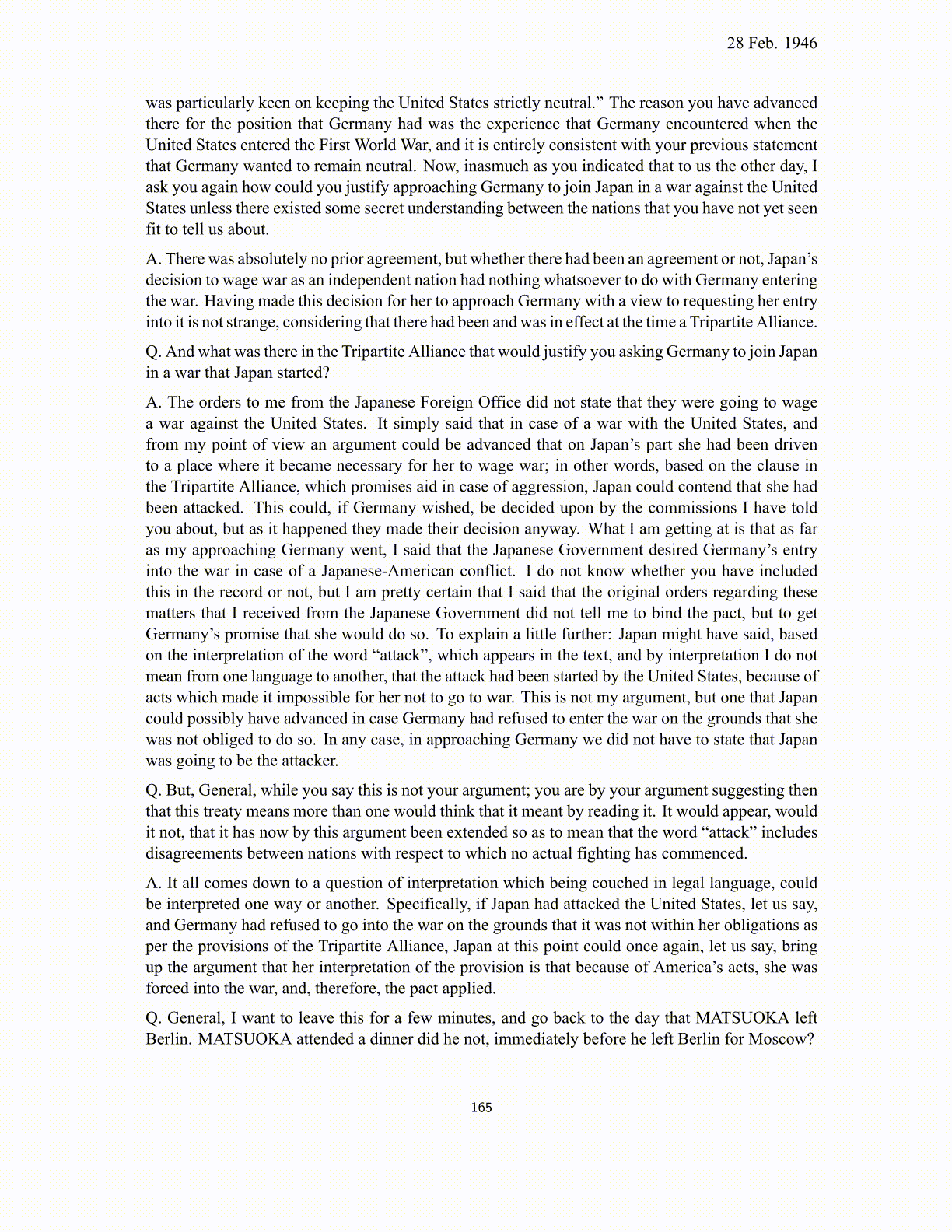
28 Feb. 1946 was particularly keen on keeping the United States strictly neutral.” The reason you have advanced there for the position that Germany had was the experience that Germany encountered when the United States entered the First World War, and it is entirely consistent with your previous statement that Germany wanted to remain neutral. Now, inasmuch as you indicated that to us the other day, I ask you again how could you justify approaching Germany to join Japan in a war against the United States unless there existed some secret understanding between the nations that you have not yet seen fit to tell us about. A. There was absolutely no prior agreement, but whether there had been an agreement or not, Japan’s decision to wage war as an independent nation had nothing whatsoever to do with Germany entering the war. Having made this decision for her to approach Germany with a view to requesting her entry into it is not strange, considering that there had been and was in effect at the time a Tripartite Alliance. Q. And what was there in the Tripartite Alliance that would justify you asking Germany to join Japan in a war that Japan started? A. The orders to me from the Japanese Foreign Office did not state that they were going to wage a war against the United States. It simply said that in case of a war with the United States, and from my point of view an argument could be advanced that on Japan’s part she had been driven to a place where it became necessary for her to wage war; in other words, based on the clause in the Tripartite Alliance, which promises aid in case of aggression, Japan could contend that she had been attacked. This could, if Germany wished, be decided upon by the commissions I have told you about, but as it happened they made their decision anyway. What I am getting at is that as far as my approaching Germany went, I said that the Japanese Government desired Germany’s entry into the war in case of a Japanese-American conflict. I do not know whether you have included this in the record or not, but I am pretty certain that I said that the original orders regarding these matters that I received from the Japanese Government did not tell me to bind the pact, but to get Germany’s promise that she would do so. To explain a little further: Japan might have said, based on the interpretation of the word “attack”, which appears in the text, and by interpretation I do not mean from one language to another, that the attack had been started by the United States, because of acts which made it impossible for her not to go to war. This is not my argument, but one that Japan could possibly have advanced in case Germany had refused to enter the war on the grounds that she was not obliged to do so. In any case, in approaching Germany we did not have to state that Japan was going to be the attacker. Q. But, General, while you say this is not your argument; you are by your argument suggesting then that this treaty means more than one would think that it meant by reading it. It would appear, would it not, that it has now by this argument been extended so as to mean that the word “attack” includes disagreements between nations with respect to which no actual fighting has commenced. A. It all comes down to a question of interpretation which being couched in legal language, could be interpreted one way or another. Specifically, if Japan had attacked the United States, let us say, and Germany had refused to go into the war on the grounds that it was not within her obligations as per the provisions of the Tripartite Alliance, Japan at this point could once again, let us say, bring up the argument that her interpretation of the provision is that because of America’s acts, she was forced into the war, and, therefore, the pact applied. Q. General, I want to leave this for a few minutes, and go back to the day that MATSUOKA left Berlin. MATSUOKA attended a dinner did he not, immediately before he left Berlin for Moscow? 165